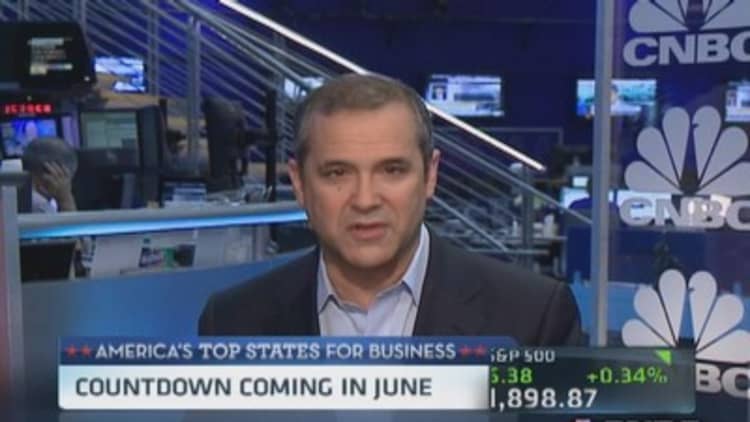What four words are central to every modern American campaign?
"It's the economy, stupid."
And in the 36 states electing governors in 2014, it's the economy and not much else. Governors seeking re-election this year took office at the end of the worst downturn since the Great Depression. They campaigned on promises to turn things around; now they're running on their records. And their challengers are … challenging them.
Read MoreAmerica's Top States for Business 2014
How do this year's campaign claims by incumbents and challengers square with reality? We have eight years' worth of Top States data to help sort things out. And in this year's key battles, our numbers should come in handy.
Peach or Pit?
For better or worse, this year's study hands a big talking point to the campaign of Top State Gov. Nathan Deal of Georgia, a Republican touting his economic record in his bid for a second term.
"By cutting taxes and reducing red tape, he's helped to create 235,000 jobs," Deal's website claims. "As a result of his fiscally conservative leadership, Georgians enjoy one of the lowest tax burdens in the nation."
His opponent, Democratic State Sen. Jason Carter, says Deal has short-changed small businesses and the middle class, and notes that unemployment in the state remains well above the national rate.
"We need a strong climate for business," Carter's website says, "and you can't have a strong economy if the middle class and small business owners are being left behind."
Georgia has rebounded from a recession that hit the state harder than many. Its ranking in our study has improved as well. Georgia's Top State ranking this year compares to eighth place last year and 10th in 2010, the year before Deal took over.
The state has indeed added jobs, according to the U.S. Bureau of Labor Statistics, though at 189,000 nonfarm jobs through April it's a bit short of the Deal's number.
So, does the governor get credit for Georgia's turnaround and its number one ranking? Some, but probably not as much as he'd like.
Even in the worst of times, Georgia performs relatively well in our rankings due to advantages that were in place well before the governor took office: a top-notch infrastructure with the world's busiest airport and one of the nation's most important ports, as well as a large workforce in a right-to-work state.
Read MoreGuess this year's top state for business
Georgia surges to the top this year thanks largely to its economy, which caught up to the national growth rate in 2013 after lagging slightly the year before. In part, that is because the housing market is recovering just like it is elsewhere in the country. But the Deal administration has also been aggressively courting businesses. In June, the state announced that Chime Solutions would build a state-of-the-art call center in a converted J.C. Penney store in Clayton County, south of Atlanta, adding more than 1,000 jobs.
Georgia's tax burden on businesses is indeed among the lowest in the country, but with higher-than-average wages, office rent and gasoline taxes, the state's Cost of Doing Business rank is the same as it was before Deal took office—20th. And its Business Friendliness rank—14th—is little changed from 17th in 2010.
Wisconsin: Open for business?
Elsewhere, Gov. Scott Walker, a rising Republican star, campaigned in 2010 on a promise to create 250,000 jobs in Wisconsin during his first term. With roughly six months left, he is on pace to end about 150,000 jobs short. His opponent, former state Commerce Secretary Mary Burke, has made much of the shortfall, promising to create jobs by pushing "energy clusters," seeking out global markets and nurturing start-ups.
Our rankings show that Wisconsin's business climate has improved since Walker took office in 2011 and declared the state "open for business." Wisconsin has improved to 17th overall in 2014 from 29th in 2010.
But behind the numbers, it isn't clear how much the governor had to do with it. Not only has job growth been tepid, but in areas Walker has emphasized—like cutting taxes and reforming the legal system—Wisconsin has barely budged relative to the competition.
Read MoreA state-by-state scorecard on Obamacare
The state has the fifth-highest tax burden in the nation, according to the Tax Foundation, contributing to Wisconsin's 26th place ranking in our Cost of Doing Business category compared to 24th four years ago.
The state ranks 25th for Business Friendliness, versus 27th in 2010. Even Walker's controversial move to prohibit collective bargaining by most state employees has not helped the state's workforce ranking much. It finishes 40th in 2014 compared to 46th before Walker took office.
Who turned Michigan around?
When former venture capitalist Rick Snyder took office as Michigan's governor on New Year's Day 2011, the state unemployment rate was 11.3 percent—and that was down from its recession high of 14.2 percent in 2009. Now, unemployment is at levels not seen since 2008, and Snyder is claiming credit.
"Rick Snyder has created a better environment for job creators," his campaign website declares.
There is no question that a lot has changed in Michigan—its ranking in America's Top States for Business, for instance. In 2010, the year before Snyder took over from Democrat Jennifer Granholm, we ranked Michigan 41st overall, with the 47th ranked economy and a Workforce ranking of 41. This year, the state ranks 26th overall with the 28th best economy and the 15th best workforce.
Snyder's opponent, former Democratic Rep. Mark Schauer, is promising "an economy that works for everyone," and accusing Snyder of leaving Michigan's middle class behind.
"Mark understands what the economy looks like not just to corporate CEOs, but to the hard-working Michiganders who make our economy tick," his campaign website says.
Regardless of how people view Michigan's transformation—sweeping or uneven—it's hard to argue Snyder doesn't own it.
Early in his term, he pushed through a $1.6 billion tax cut for businesses, offset by $1.4 billion in tax increases on individuals—including taxing pensions and Social Security benefits. Michigan's ranking in our important Cost of Doing Business category has barely budged—32nd then, 31st now—in part because we consider tax burdens on individuals and corporations in computing costs.
Read MoreState winners and losers in the jobs war
Also barely changed: Michigan's ranking for Business Friendliness—35th in 2010, 32nd this year—despite Snyder's pledge to "reinvent" the state's business climate. And it's hard to separate the improvement in Michigan's economy from the federal rescue of the auto industry.
But other moves under Snyder have been profound.
Few could have imagined before he took office that the birthplace of the United Auto Workers union would become a right-to-work state, but that is exactly what happened last year after Snyder pushed the legislation through in 2012. The move remains deeply controversial, but it did earn Michigan points in our Workforce category.
Snyder's biggest gamble has yet to play out. He engineered a state takeover of the perpetually troubled city of Detroit, installing a hand-picked emergency manager who quickly filed the largest municipal bankruptcy in U.S. history. The move, which has precipitated a massive restructuring of the city's debt, has angered unions and bondholders alike. But if the plan works, Snyder will have pulled off what half a dozen of his predecessors could not: transforming Michigan's largest city.
A new New York?
In a state often perceived as unfriendly to business—even if it is the nation's financial capital—New York Gov. Andrew Cuomo has sought to turn things around.
"New York has no future as the tax capital of our nation," Cuomo said in his first State of the State address in 2011. Since then, the Democrat's campaign website says he has cut individual and corporate taxes and won a cap on property taxes. In the latest move to attract business, the state is running a multimillion dollar national ad campaign promoting "Start-Up NY," which offers 10 years free of all taxes to businesses that agree to partner with universities.

But his Republican opponent, Westchester County Executive Rob Astorino, says New York remains a high-tax, high-regulation state, and he vows to change that.
Read MoreThe financial state of states
"That's how you grow an economy," says his website, "not with empty TV ads."
Our Top States rankings show that whoever is New York governor in January (Cuomo currently holds a commanding lead in the polls), he will still have plenty to do.
New York ranks 40th overall this year, down from 24th in 2010. It remains the most expensive state to do business in, same as it was in 2010. We consider more than just taxes in our Cost of Doing Business category. We also look at wages, rental and utility costs, all of which, state officials say, are skewed by the expensive New York metropolitan area. But New York still has the nation's highest tax burden.
Tale of two governors
The governor's race in Florida allows us to compare two governors against our Top States rankings: Republican Rick Scott, who is seeking a second term, and Republican-turned-Democrat Charlie Crist, who is seeking to win the office back. Crist was governor from 2007—the first year of our study—until 2011.
In the final year of Scott's first term, Florida ranks 20th overall in America's Top States for Business. In Crist's last full year, 2010, the state ranked 28th.
Crist must first defeat former State Senator Nan Rich in an Aug. 26 primary before he can take on the governor, but he is already setting his sights on Scott, particularly on the issue of education.
"When I was governor, we did things to help education," Crist said recently. He claims Scott "has wrecked it."
The Scott campaign, meanwhile, has run TV ads accusing Crist of raising tuition at state colleges and leaving K-12 schools in worse shape than when he took office.
Read MoreAmerica's top states to live in 2014
Our Top States rankings look at education, one of our 10 categories of competitiveness. And it turns out neither candidate's record is much to write home about.
Florida ranks 35th in Education this year, which is exactly where it was in the final year of Crist's term. In Crist's first year in office—2007—the state ranked 37th.
Florida high school students' ACT scores were among the worst in the country last year, just as they were in 2010.
Funding for higher education has declined more than 42 percent over the past five years, according to State Higher Education Executive Officers, a nonprofit association that measured a period running from the middle of Crist's term through last year. That means the two governors share the second-worst record on higher education funding in the nation.
—By CNBC's Scott Cohn





